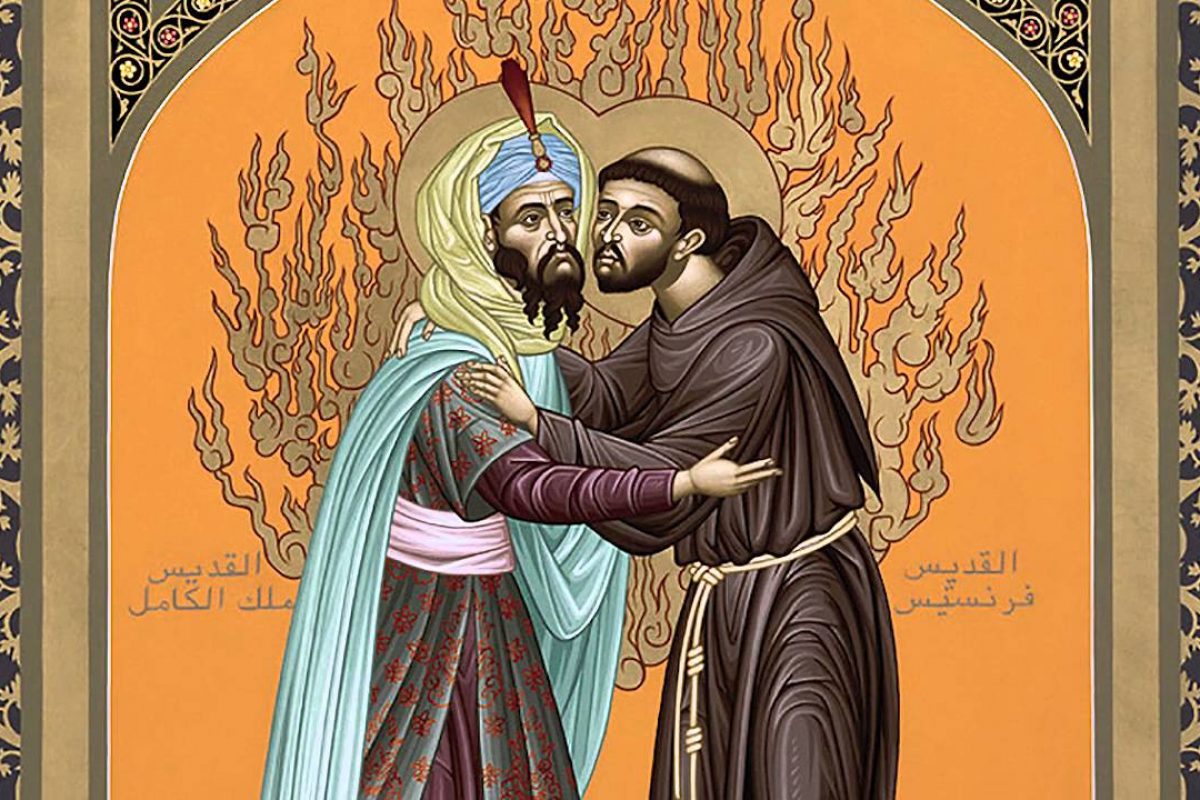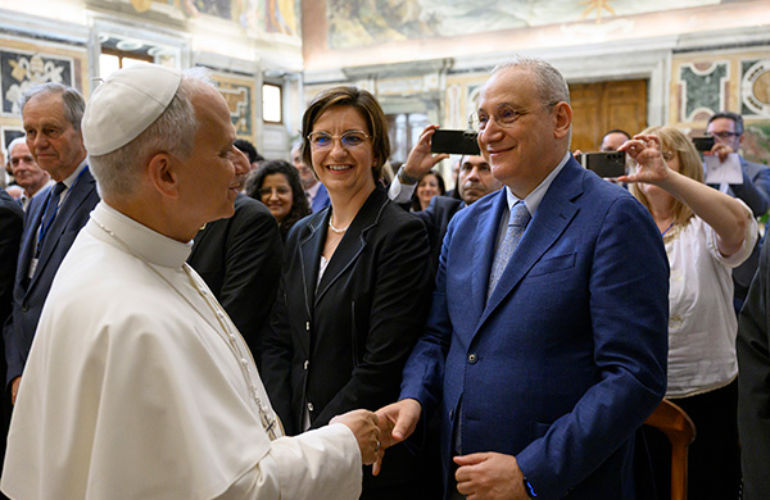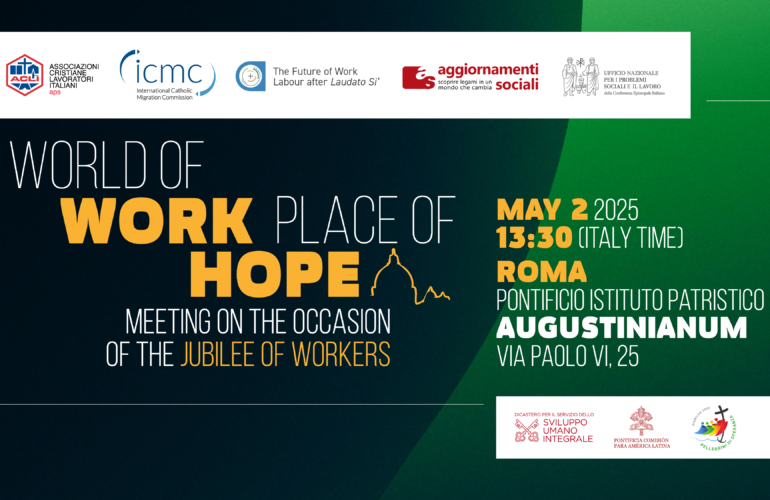Reflections on the Papal Encyclical Fratelli Tutti
Pope Francis’ new encyclical is a strong denunciation of the physical, ideological, emotional and intellectual walls and barriers that many of us set up in order to prevent meaningful encounters with “others” – and a thoughtful proposal of an antidote to break them down.

By Msgr. Robert J. Vitillo *
The new encyclical letter of Pope Francis, released on 4 October 2010, is especially welcome amidst a global health crisis that has made more visible the terrible fractures and inequalities in our world. But the COVID-19 pandemic has also spotlighted tendencies to close in on ourselves or to grasp at nationalistic and self-serving ideologies as solutions, even though they simply lead us to greater division and violence.
Pope Francis raises his serious concern that “the sense of belonging to a single human family is fading, and the dream of working together for justice and peace seems an outdated utopia.” The Holy Father also decries today’s “cool, comfortable and globalized indifference” and the temptation to “go down the road of disenchantment and disappointment.” He insists that “isolation and withdrawal into one’s own interests are never the way to restore hope and bring about renewal.” On the contrary, Pope Francis proposes the antidote of “closeness [which] is the culture of encounter.” [Fratelli Tutti, n.30]
One of the most impressive features of the new encyclical is Pope Francis’ denunciation of the physical, ideological, emotional and intellectual walls and barriers that many of us set up to prevent meaningful encounters with “others”. Thus, Pope Francis recalls his namesake, St. Francis of Assisi, who broke down such walls in his day.
Today, the Holy Father proposes to us the way of life for all Christians – that of unselfish and unlimited love – which is at the very heart of Jesus’ Gospel and of the Redemption that Jesus offers us members of the human family who are made in the image and likeness of God.
Migrants and Refugees as Part of Society
In his letter, the Pope offers authoritative teaching on migration and on the gifts that migrants bring to the societies that welcome them. He takes serious issue with “certain populist political regimes, as well as certain liberal economic approaches, [which] maintain that an influx of migrants is to be prevented at all costs.” In response, he asserts “that behind such statements, abstract and hard to support, great numbers of lives are at stake. Many migrants have fled from war, persecution and natural catastrophes.” [Fratelli Tutti, n.36]
The Holy Father expresses deep regret that “migrants are not seen as entitled like others to participate in the life of society, and it is forgotten that they possess the same intrinsic dignity as any person [and] … by our decisions and the way we treat them, we can show that we consider them less worthy, less important, less human.” Pope Francis asserts that “for Christians, this way of thinking and acting is unacceptable, since it sets certain political preferences above deep convictions of our faith: the inalienable dignity of each human person regardless of origin, race or religion, and the supreme law of fraternal love.” [Fratelli Tutti, n.39]
These are messages that the International Catholic Migration Commission has long been proclaiming by its words in global advocacy circles, by its direct humanitarian service and by its networking with its national member Episcopal Conferences throughout the world. Such beliefs and practices constitute a fundamental pillar of ICMC’s very identity as a Catholic Church-inspired organization that serves all people without any distinction and that respects the dignity of each and every person. In so doing, ICMC recognizes the common values observed by all major religious traditions as well as non-believers who are motivated by good will.
The Need To Transform the World
Pope Francis calls on us all to work together to transform the world by respecting the fundamental rights of all. He also upholds the common destination of goods over and above the desire to prioritize profit over people ― a desire so prevalent in the economic strategies and financial speculation that dominate today’s world.
The Holy Father recognizes the key role that could be played by a reformed United Nations. He envisions a UN that focuses on the “family of nations” on the present-day world stage in which the power of nation-States has been diminished by the globalization of the economy and profit-making that supersedes adequate governmental controls or inter-governmental policy-setting and monitoring.
Pope Francis also calls for just and decent work for all and for access by all to such labor opportunities. He also recognizes the transformative role that social movements could play as they strive to promote a social economy built on solidarity and equality.
In fact, the title “Fratelli Tutti” (brothers all) is taken from Saint Francis’ admonitions to the women and men who were following his new way of living the Christian gospel. They had set out to live in voluntary poverty, sharing all with the poorest and most marginalized people, embracing peace and reconciliation as a foundation of life and loving all people – even their enemies – as brothers and sisters.
It is a long Catholic Church tradition for Popes to entitle encyclical letters with their first two or three opening words. Thus, Pope Francis gave this document the title of St. Francis’ advice to his followers. But he also clarified that his namesake was addressing both women and men of the thirteenth century, as is intended as well by his encyclical.
Pope Francis also noted that this document was inspired by St. Francis’ visit to Sultan al-Malik al-Kamal in 1219 to seek peace and understanding with the Muslim leader at a time when the world was entangled in religious and ethnic strife. Thus, like his namesake more than 800 years ago, the Holy Father urges peace-making based on mutual respect and recognizes the horror and futility of war.
Such mutual respect was actively promoted by both Pope Francis and the Grand Imam of Al-Azhar, Ahmad Al-Tayyeb, in the Document on Human Fraternity for World Peace and Living Together that they signed on 4 February 2019.
Through ICMC’s service to refugees and forcibly displaced persons in several countries where there is a significant majority of persons who adhere to the Muslim faith, we have learned well, and benefited from, the common values and hopes that we share as Christians and Muslims as well as with other major faith traditions.
Pope Francis has written Fratelli Tutti “as a modest contribution to continued reflection” and “an invitation to dialogue among all people of goodwill.” He hopes “that in the face of present-day attempts to eliminate or ignore others, we may prove capable of responding with a new vision of fraternity and social friendship that will not remain at the level of words.” May we be able to respond to the Holy Father’s call with open hearts.
* Msgr. Robert J. Vitillo is Secretary General of the International Catholic Migration Commission



